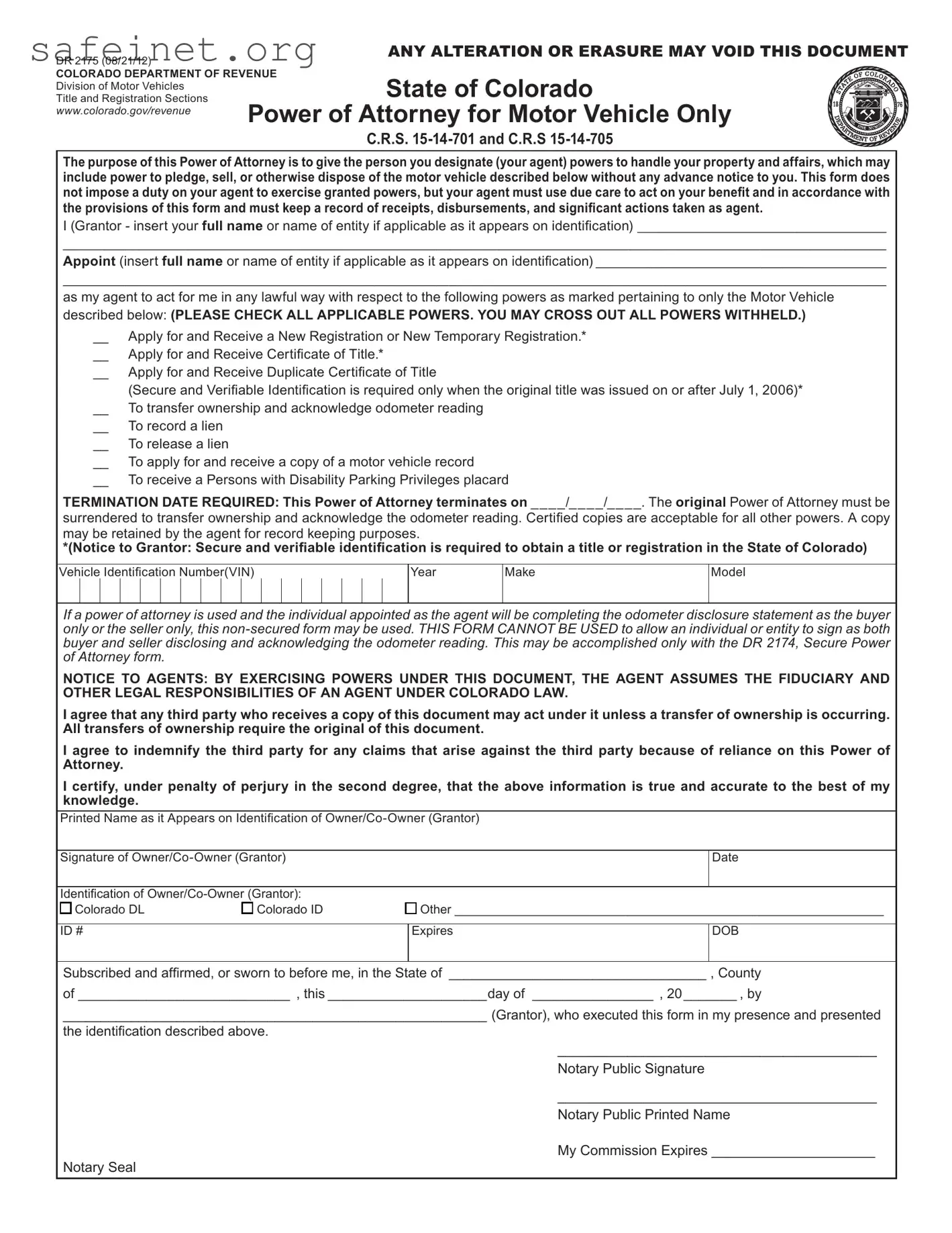What is the Vehicle POA (Power of Attorney) DR2175 form?
The Vehicle POA DR2175 form is a legal document that allows an individual (the principal) to designate another person (the agent) to act on their behalf regarding specific vehicle-related transactions. These transactions can include signing documents, transferring titles, or dealing with the Department of Motor Vehicles (DMV) on the principal's behalf.
Who needs to use the Vehicle POA DR2175 form?
This form is beneficial for anyone who wants to authorize another person to manage their vehicle-related tasks. Common scenarios include situations where the vehicle owner is unable to be present to complete paperwork, such as during travel or health issues. It is also useful for those who are selling a vehicle but cannot be physically present for the transaction.
How do I fill out the Vehicle POA DR2175 form?
To complete the form, you will need to provide your name and contact information as the principal. Additionally, the name and contact information of the designated agent must be included. Information about the vehicle in question, such as the make, model, year, and Vehicle Identification Number (VIN), should also be specified. Finally, both parties must sign and date the form to validate it.
Do I need a witness or notary to validate the form?
While it is not typically required for the Vehicle POA DR2175 form to be signed in the presence of a notary or witness, having a notary can provide additional assurance of the document’s legitimacy. Check specific state requirements, as these can vary.
What powers does the agent have under the Vehicle POA DR2175 form?
The agent can perform various tasks related to the vehicle, which can include signing title transfer documents, applying for license plates, registering the vehicle, and handling transactions at the DMV. The specific powers granted should be clearly defined in the form to avoid any confusion.
Can the Vehicle POA DR2175 be revoked?
Yes, the Vehicle POA can be revoked at any time by the principal. To ensure clarity and avoid complications, it is advisable to provide written notice of the revocation to the agent and any parties who may have relied on the original Power of Attorney. Additionally, consider submitting the revocation notice to the DMV if the form was previously filed there.
How long is the Vehicle POA DR2175 form valid?
The form is valid until the principal revokes it, the purpose for which it was created is fulfilled, or the principal passes away. It is wise to include a specific expiration date or condition in the form if a limited duration is desired.
Is there a fee to file the Vehicle POA DR2175 form?
Generally, there is no fee to complete or file the Vehicle POA DR2175 form itself. However, standard DMV fees may apply if the agent is using the form to facilitate registration or other transactions with the agency. Always check the specific requirements of your local DMV.
Where can I obtain the Vehicle POA DR2175 form?
The Vehicle POA DR2175 form can typically be obtained from the Department of Motor Vehicles (DMV) in your state. Additionally, many DMV websites offer downloadable versions of the form. Make sure you are using the correct version for your state, as requirements may differ.
What should I do if I have more questions about the Vehicle POA DR2175 form?
If you have further inquiries, consider contacting the DMV directly or consulting with a legal professional who specializes in vehicle-related issues. They can provide specific information based on your circumstances and ensure that you understand all aspects of the Power of Attorney process.

